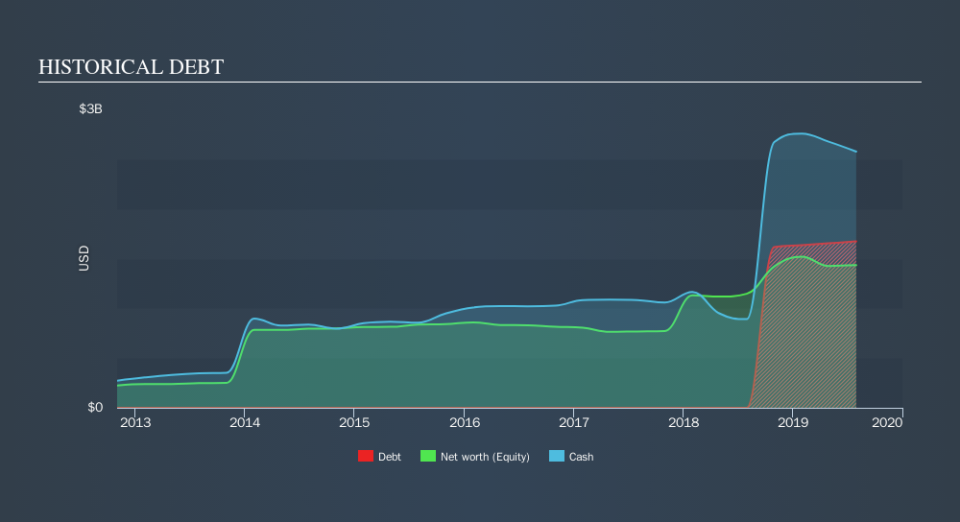Is Splunk (NASDAQ:SPLK) Using Debt Sensibly?

Some say volatility, rather than debt, is the best way to think about risk as an investor, but Warren Buffett famously said that 'Volatility is far from synonymous with risk. It's only natural to consider a company's balance sheet when you examine how risky it is, since debt is often involved when a business collapses. As with many other companies Splunk Inc. (NASDAQ:SPLK) makes use of debt. But the real question is whether this debt is making the company risky.
What Risk Does Debt Bring?
Debt assists a business until the business has trouble paying it off, either with new capital or with free cash flow. Ultimately, if the company can't fulfill its legal obligations to repay debt, shareholders could walk away with nothing. However, a more usual (but still expensive) situation is where a company must dilute shareholders at a cheap share price simply to get debt under control. Having said that, the most common situation is where a company manages its debt reasonably well - and to its own advantage. When we examine debt levels, we first consider both cash and debt levels, together.
Check out our latest analysis for Splunk
How Much Debt Does Splunk Carry?
As you can see below, at the end of July 2019, Splunk had US$1.67b of debt, up from US$68.5m a year ago. Click the image for more detail. But on the other hand it also has US$2.58b in cash, leading to a US$902.3m net cash position.
A Look At Splunk's Liabilities
We can see from the most recent balance sheet that Splunk had liabilities of US$1.03b falling due within a year, and liabilities of US$2.03b due beyond that. Offsetting these obligations, it had cash of US$2.58b as well as receivables valued at US$408.9m due within 12 months. So it has liabilities totalling US$69.0m more than its cash and near-term receivables, combined.
Having regard to Splunk's size, it seems that its liquid assets are well balanced with its total liabilities. So while it's hard to imagine that the US$17.7b company is struggling for cash, we still think it's worth monitoring its balance sheet. While it does have liabilities worth noting, Splunk also has more cash than debt, so we're pretty confident it can manage its debt safely. The balance sheet is clearly the area to focus on when you are analysing debt. But ultimately the future profitability of the business will decide if Splunk can strengthen its balance sheet over time. So if you want to see what the professionals think, you might find this free report on analyst profit forecasts to be interesting.
In the last year Splunk wasn't profitable at an EBIT level, but managed to grow its revenue by36%, to US$2.0b. Shareholders probably have their fingers crossed that it can grow its way to profits.
So How Risky Is Splunk?
Although Splunk had negative earnings before interest and tax (EBIT) over the last twelve months, it generated positive free cash flow of US$51m. So taking that on face value, and considering the net cash situation, we don't think that the stock is too risky in the near term. One positive is that Splunk is growing revenue apace, which makes it easier to sell a growth story and raise capital if need be. But we still think it's somewhat risky. When I consider a company to be a bit risky, I think it is responsible to check out whether insiders have been reporting any share sales. Luckily, you can click here ito see our graphic depicting Splunk insider transactions.
If, after all that, you're more interested in a fast growing company with a rock-solid balance sheet, then check out our list of net cash growth stocks without delay.
We aim to bring you long-term focused research analysis driven by fundamental data. Note that our analysis may not factor in the latest price-sensitive company announcements or qualitative material.
If you spot an error that warrants correction, please contact the editor at editorial-team@simplywallst.com. This article by Simply Wall St is general in nature. It does not constitute a recommendation to buy or sell any stock, and does not take account of your objectives, or your financial situation. Simply Wall St has no position in the stocks mentioned. Thank you for reading.

 Yahoo Finance
Yahoo Finance 
